- Gyvenimo lentelė
- Požiūrio lygtis, Suvokimas, Apibrėžimas
- Ketverybė, Ketverybės, Dvasia, Amžino gyvenimo pjūvis
- Aštuonerybė, Pasirinkimai
- Dievas, Gerumas, Gyvenimas, Amžinas gyvenimas
- Viskas, Laisvumas, Betkas, Išmintis
- Troškimai, Tapatumai, Pasirinkimai, Gera valia
- Meilė, Tobulumas, Valia, Dievo valia
- Šv Jono Evangelija, Dievas nebūtinai geras
Kokia gyvenimo lygties reikšmė?
生命方程
Lygmenys
- Kuria prasme viskas yra (Dievo) sandara ir tuo pačiu atvaizdas (apimtis)?
- Koks ryšys tarp sandarų ir atvaizdų? Dievo sandara viskas (palyginti su betkuo, kažkuo, niekuo). Gerumo sandara laisvumas (ir būtent didėjantis laisvumas - palyginti su mažėjančiu laisvumu). Gyvenimo sandara tai betkas.
- Kaip gyvenimo lygtis sieja gyvenimą, betką, pasirinkimus ir valią su keturiais asmenimis, keturiomis apimtimis?
Apimtys
- Dievui atitinka sandara viskas. Gyvenimui atitinka sandara betkas. O kokia dvasia atitinka sandaroms kažkam ir niekam?
Dievas ir gerumas
- Kaip santykis tarp Dievo ir gerumo susijęs su santykiu tarp nulybės ir septynerybės?
- Visame žinojime, koks ryšys tarp Dievo, amžino gyvenimo, gyvenimo ir gerumo? Kaip tai atsispindi sandarose? ir būtent Dievo ar mūsų požiūryje?
Gyvenimas ir amžinas gyvenimas
- Kaip deri gyvenimas ir amžinas gyvenimas?
Atvaizdai
- Betkas turi šešis atvaizdus, pasirinkimus. O kiek jų turi išmintis? ir kas jie yra? (4 x 2)
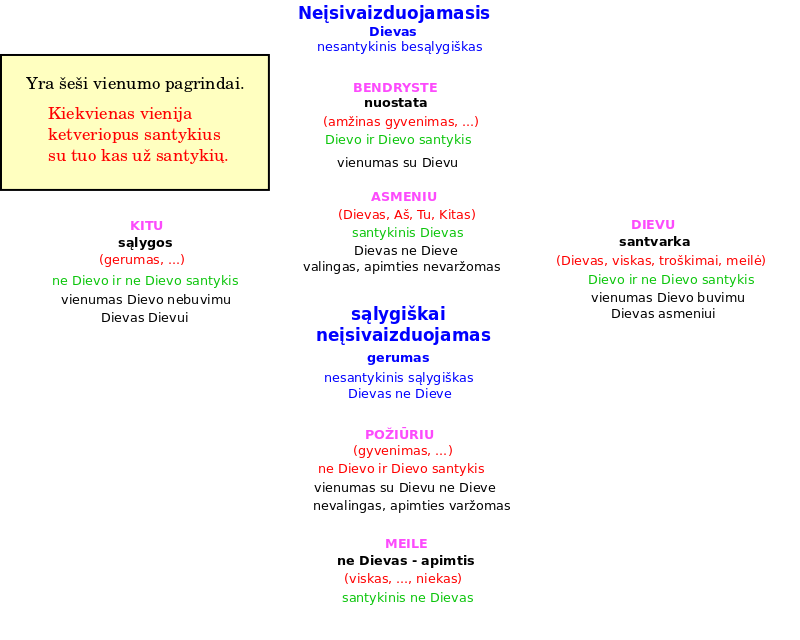
Kas yra gyvenimo lygtis
Gyvenimo lygtis apibūdina santykius su tuo, kas už vaizduotės
Gyvenimo lygtis išsako tai kas yra už vaizduotės, ir būtent išsako dvi galimybes kuriomis galime gyventi, tai yra, į kurias galime atsiremti visu gyvenimu. Gyvenimo lygtį įsivaizduojame keturiais lygmenimis: dvasia, sandara, atvaizdais, vieningumais.
Kas yra gyvenimo lygtis
- Gyvenimo lygtis yra atsakymas į gyvenimo klausimą, keturi atsakymai į keturių apytakų tyrimus.
- Gyvenimo lygtis 4x4 išreiškia semantiką sintakse 4 lygmenimis ir išreiškia sintaksę semantika 4 lygmenimis.
- Gyvenimo lygtis iškyla išgyvenimo apytaka, išplečiant Dievo šokį ketverybe, žinojimu ir nežinojimu. Gyvenimo lygtis išryškina skirtumą tarp Dievo žinojimo ir žmogaus nežinojimo. Dievą naujai išreiškia pabrėžiant jo nežinojimą.
- Požiūrio lygtis sustato požiūrį, jo sąlygas. Gyvenimo lygtis tą požiūrį pakartotinai plėtoja asmenimis, klodais, grandine.
Ką veikia gyvenimo lygtis
- Gyvenimo lygtis išreiškia kaip buvimui atrodo nebuvimas, kaip Dievui atrodo meilė, kaip dvasiai atrodo vieningumas.
- Gyvenimo lygtis priima ryšio galimybes ir išsako kaip jas išgyvena apimties asmuo.
- Gyvenimo lygtimi pirma yra požiūris ir tik paskui yra jį išgyvenantis asmuo. Užtat asmens liudijimas yra prasmingas nes tai ką jisai liudija yra svarbiau už jį patį.
- Gyvenimo lygtis išsako vaizduotės neiškreiptą tikrovę, kad pirma yra ryšių galimybė ir tik tada yra apimties nusakytas asmuo. Užtat gyvenimo lygtis išsako neįsivaizduojamojo tikrovę.
- Keturi lygmenys nusako vienumo galimybes, kaip jisai gali būti išgyventas, koks gali būti santykis tarp vienumo ir jį išgyvenančio asmens: Dievas dvasia išgyvena tiesiogiai, Aš sandara išgyvenu netiesiogiai - už savęs, Tu atvaizdais neišgyveni tiesiogiai, Kitas vieningumu neišgyvena netiesiogiai.
- Meilė išsako Dievo tikslingumą nes jisai atsisako savęs vardan gerumo. O tobulumas išsako gerumo tikslingumą nes viskas susiveda į gerumą.
Kodėl yra gyvenimo lygtis
- Mes negalime įsivaizduoti paskiro Dievo nes jisai be ryšio, bet mes gyvenimo lygtimi galime įsivaizduoti Dievo santykį su gerumu, jam išėjus už savęs, tad gyvenimo ir amžino gyvenimo skirtumą, mūsų pasirinkimą.
- Mes negalime Neįsivaizduojamojo (Dievo) įsivaizduoti, tačiau galime įsivaizduoti kaip Dievas mus įsivaizduoja. Tai yra žmogaus požiūris į Dievo požiūrį. Užtat tai sutampa su jokiu požiūriu. Tad įsivaizduojame kaip Dievas išeina už savęs į save.
Keturi lygmenys
Gyvenimo lygtis galioja keturiuose lygmenyse: dvasios, sandaros, atvaizdų ir vieningumo.
| Dvasia | Dievas | gerumas | gyvenimas | amžinas gyvenimas |
| sandara | viskas | laisvumas | betkas | išmintis |
| atvaizdai | troškimai | tapatumai | pasirinkimai | gera valia |
| vieningumas | meilė | tobulumas | valia | Dievo valia |
| dvasia | sandara | atvaizdai | esmė |
| poreikiai | abejonės | lūkesčiai | vertybės |
Gyvenimo lygties lygmenys
- Lygmenys yra išėjimo už savęs į save pakopos.
- Lygmenys nusako sąvokų apimtis.
- Kiekviename lygmenyje požiūrio lygtis išsako sąvokos sąlygas, to lygmens suvokėjo santykį su besąlygišku suvokėju, tad su Dievu.
- Neigimas įveda keturis lygmenis. Jie nusako santykį tarp pirminės aplinkos ir naujos aplinkos, ar jisai išsakytas ar ne, ar jie sutampa ar ne, ar jie teigiami ar neigiami.
- Galiu pabrėžti gyvenimo lygties asmenis, jų požiūrius: Dievo, Mano (gerumo), Tavo (gyvenimo - atgal į Dievą, bendravimą), Kito (amžino gyvenimo - lygiagrečiai, bendrystę, su Dievu).
- Nuo dvasios atsiplėšia sandara. Atvaizdai juos sieja, o vieningumas skiria ir suderina.
- Vertybių kalbos lygmenys:
- Asmenys (Dievas)
- Jų (bendros, bendro asmens) aplinkybės, juos visus siejančias.
- Paskiro (mano) asmens santykis su kitais asmenimis.
- To santykio paryškinimas (pasaulyje).
Dvasios lygmuo
- Gyvenimo lygtis apibrėžia Dievą, gerumą, gyvenimą ir amžiną gyvenimą.
- Dievas yra dvasia. Sandara yra už dvasios. Gerumas yra dvasia sandaroje. Gyvenimas yra sutapimas dvasios už sandaros ir sandaroje. Kitaip tarus, gyvenimas yra reiškinys, kad Dievas yra geras.
- Dvasia yra veikla, pasikartojanti veikla.
- Dvasios sąvokų apimtis yra viskas.
- Dvasia sukuria sandarą išeidama už savęs. Tačiau tuo pačiu dvasia įsodinama sandaroje, ji save aptinka sandaroje. Ta dvasia - mes ribotieji - privalo reikštis išeidama už savęs, ir už sandaros, į tai ką mes nuvokiame esant už mūsų. Tokiu būdu mes įveikiame sandarą kurioje save randame.
Sandaros lygmuo
- Sandaros sąvokų apimtis yra betkas.
- Sandara yra tai kas lieka pasitraukus dvasiai. Sandara yra dvasios nebuvimas, jos rėmai ir jos prielaidos. Užtat galime skirti besąlygišką dvasią už prielaidų ir sąlygišką dvasią prielaidose. Tokiu būdu galime atpažinti savo prielaidas ir jų atsisakyti.
- Sandarą galime suprasti kaip dvasios nebuvimą.
- Sandara susijusi su padalinimais.
- Sandara yra tai, kas gaunasi, kada dvasia išeina už savęs į save, užtat dvasia pasitraukia, tad lieka sandara. Tad sandara yra dvasios nebuvimas.
- Sandaros yra sienos sudarančios turiningą geometriją kuria dvasia gali įvairiai su savimi sietis.
- Viskas yra sandara.
Atvaizdų lygmuo
- Atvaizdų sąvokų apimtis yra kažkas.
- Atvaizdai, tai kas mes esame kitiems.
- Tapatumas: Jėzus jungia du įsakymus: Mylėti Dievą, mylėti artimą kaip save patį.
- Pasirinkimuose (betkame, gyvenime) yra dviprasmybė tarp troškimo (visko, Dievo) ir tapatumo (laisvumo, gerumo). Gerą valią sudaro aštuoni (4 apimtys x 2 laisvumo kryptys) atvaizdai (gėrio kryptys), tarp jų ir gera širdis, tad joks atvaizdas (vienetinis atvaizdas).
- Žinojimas turi keturis atvaizdus, o taikymas turi du atvaizdus. Tobulumas, susitapatinimas, laisvumas, gerumas - tai žinojimo taikymas. O meilė, troškimai, viskas, Dievas - tai žinojimas. Juos suveda betkas savo šešiais atvaizdais, o atskiria išmintis.
Vieningumo lygmuo
- Vieningumai įvairiai išreiškia pritarimą, sutikimą, neprieštaravimą, tad meilę - tiek pačia meile, tiek valia, tiek Dievo valia, tiek tobulumu. Tobulumas, valia, Dievo valia išreiškia meilės santykį su sąlygomis, su nesutikimu, prieštaravimu, neigimu. Vieningumas išsako tai, kad pritarimas yra esmė nieko apimtyje palaikantis platesnę raišką įvairiausiose apimtyse, palaikantis visišką atsiskleidimą. Pritarimas yra palaikymas, prisidėjimas.
- Vieningumo sąvokų apimtis yra niekas.
- Esmė, tai kas mes esame, kada mes vienų vieni.
- Mūsų esmė, tai mūsų atvaizdų vieningumas.
- Esmė (Dievo valia) yra atskirti meilę ir tobulumą, tad mylėti netobulą. Ta galimybė yra mūsų sąlygos, iš kurių kildiname Dievą.
- Mylėti netobulą: Atleisk mums mūsų kaltes... atleidžiam Dievui, kaip jis atleidžia mums.
- Esmė apima visas savybes. Tad esmė yra savybių vieningumas, o savybės yra atvaizdai.
- Esmė yra taškas kuriuo, pavyzdžiui, Dievas išverčiamas, taip kad prieiname prie platesnio, Dievo sąlygose glūdinčio Dievo, kuriuo visi esame viena.
- Esmė yra įrodymas, jog Dievas išėjo už savęs, kaip tvirtina teigiami įsakymai.
- Vieningumas susijęs su aplinkybėmis.
- Coherence is unity of representations. We may think of coherence as necessity.
- Sena mintis: The fourth equation of life is: Will is the Essential in Love. (Here In is the opposite of Of in the first equation. Instead of going into the system, we extend outside of the system.)
Priėjimo lygmenys
- There are four levels of access between God as Observer and God as Observed: nothing, something, anything and everything. God as Observer is the one beyond any system who derives Human as he goes beyond himself. So as this God enters the system we have: God, everything, wishing, love. But also, Human is God within system, and this Human pulls away from himself and thereby opens up room for God. As Human pulling away from himself, he is making separate, thus keeping separate God and good, thus allowing for God beyond system, and manifesting himself as God within system. This means that we can think of Human as beyond system as: God's will, good will, wisdom and eternal life. These all are expressions of Human who has gone beyond the system and hence is one with God. This sequence starts with complete deference and ends with complete coinciding of God and human. The complete deference to God's will shows that even when there is no access between God and human, it is possible for them to be connected by way of human's submission to God. Then the access opens up, so that good will is access by way of something - a channel for good, and wisdom is access by way of anything - a point to focus around, and finally eternal life is access by way of everything. Meanwhile, life (as the goodness of God) is the fact that Human can be as such within a system, and thus not comparable to God, but simply a creation of God. Whereas eternal life has him as a creator, a co-creator along with God. And good is the "system" which distinguishes these possibilities and relates God and human.
- Požiūrių grandinių sulyginimas priėjimo lygmenimis. We have human's view of God's view whereby human's view goes beyond themselves to take up God's view. We have God's view of human's view whereby God's view goes beyond himself to take up human's view. How can they coincide? We have four levels of access so that the two may be considered as seeing the same. God as Observer and God as Observed can be in harmony.
Keturi stulpai
Dievo stulpas: Dievas, viskas, troškimai, meilė
- Meilė pagrįsta tvarka, o Dievas pagrįsta laisve. Laisvė yra galimybė pranokti betvarkę. Dievas duoda mums pasižiūrėti už savęs.
Gyvenimo lygties esmė
Visuma
- Gyvenimo lygtis išsako, kas mes esame.
- Gyvenimo lygtis yra apibrėžimų pagrindas. Ja sutampa apibrėžimo pavidalas (požiūrio lygtis) ir apibrėžimo turinys (asmenų ketverybė).
- Išsako, kas yra viena, ir kas neviena. Tad išsako dvasią, taipogi atskyrimą, suvokimą.
- Skirtumas tarp Dievo ir visko. Gyvenimo lygtis pagrįsta Dievu, o sandaros pagrįstos viskuo, ne Dievu. Požiūris išlaiko šį skirtumą, tai skirtumas tarp požiūrio ir jo priėmimo, jo žvilgsnio.
- Gyvenimo lygtis išsako visą, kas išsiveda iš Dievo, o būtent, savarankiškas požiūris. Turiniai - kas prieš apibrėžimą, kas išplaukia iš Dievo.
- Dievo santykiai su savimi (besąlygiškas, sąlygiškas, sutampantis, atskirtas)
- Antisandara, nesandara, atvirumas, tiesa.
- Statiška.
- Nesandarumas, sandarumas, dviprasmybė, vienareikšmiškumas.
- Sandara yra žvilgsnis, atvaizdai yra požiūris, vieningumas yra valia.
- Skiria: A, NE A, A IR NE A, A AR NE A. Čia tektų teisingai suprasti NE A, ar tai tiesiog B.
- Veiksmai +1, +2, +3 gali būti suprasti kaip požiūrio lygties dalys, vienanarė (-1), dvinarė (-2) ir trinarė (-3). Jos išreiškia veiklą, ne sandarą.
- Tiesa, Dievo supratimas.
Požiūrio lygties - gyvenimo lygties kampai:
- tiesa (nesandarumas, antisandara) - Dievas
- sąvoka (sandarumas) - gerumas
- žvilgsnis - gyvenimas
- požiūris (atskyrimas, suvokimas) - amžinas gyvenimas
Skiriasi gyvenimas ir amžinas gyvenimas
- Meilė yra tas palaikymas kuriuo galime žiūrėti Dievo akimis. Gyvenimas yra tai ką tuomi matome, o amžinas gyvenimas yra tai, kuomi žiūrime.
- Esame tai, kuomi yra meilė ir gyvenimas, amžinas gyvenimas ir amžina meilė.
- Amžinas gyvenimas vyksta dviprasmybėje, o gyvenimas vienareikšmiškas, tad veda į mirtį. Mirtis iškyla derinant gyvenimą ir amžiną gyvenimą.
- Gyvenimas sieja jautrumą ir atliepumą, o amžinas gyvenimas juos atskiria.
- Gyvenimas: jautrumas, tada atliepiamumas. Amžinas gyvenimas, tai atvirkščiai: nusistatymas, tada atsidavimas. Tai kūryba. Tai aštuntas požiūris. O gyvenimą apibrėžia septynerybė, septynios apytakos, kūno sistemos, tai tapatumai, besikartojanti veikla. O kūryba, tai netapatumas, tai nesikartoja, o plėtojasi.
- Dviprasmybė yra brandos sąlyga. Juk keičiamės ir išliekames tas pats. Palyginti su prasmingais išgyvenimais, su pradiniu ir galutiniu asmeniu ir su meile, kurios palaikomas asmuo gali atsisakyti savęs.
- Gyvenimas atskleidžia, amžinu gyvenimu atsiskleidžiama.
- Tiek gyvenimas, tiek amžinas gyvenimas yra čia ir dabar, penkerybe, tad galim rinktis. Amžinas gyvenimas yra platesnis nes apima pradžią (artimą praeitį?) ir pabaigą (artimą ateitį?).
- Gyvenimas yra amžino gyvenimo paneigimas.
- Amžinu gyvenimu teisingai suprantame gerumą, jį suprantame plačiau, suprantame jo kilmę, kad jisai kyla iš Dievo, kuris nebūtinai geras.
Renkamės tarp gyvenimo ir amžino gyvenimo
- Gyvenimo lygtis yra du atsakymai į klausimą: Ar Dievas ir gerumas sutampa? Gyvenimas tvirtina, kad sutampa, o amžinas gyvenimas, kad nebūtinai.
- Renkamės gyventi šiaip ar gyventi amžinai.
Ketverybė
- Savasties santykiai su Dievu (asmenys)
- Dinamiška.
- Išsako kaip nesandarumas pasitraukia, taip kad lieka sandarumas; kaip tas pasitraukimas atrodo vienam vaidmeniui iš įvairių jo kampų; ir koks vieningas vaidmuo susiveda, tad kaip pasitraukimą išreiškia skirtingos lygties dalys, tad koks jų vaidmuo lygtyje, kaip lygtis visaip išreiškia pasitraukimą, nesandarumo pasitraukimą, kad būtų sandarumas, tad nesandarumo kūrybą.
- Aš esu Dievas santvarkoje. Tu sieji Dievą ir Mane. Kitas atskiria Dievą ir Mane.
- Mūsų supratimas, keturiais asmenimis, kuriais suprantame jų šešis pokalbius.
Sąmoningumas ir nesąmoningumas
- Suvokimas ir nesuvokimas pasireiškia suvokimo lygmenimis. Juos pavaizduoja pasiklydę vaikai, išmintingas ir paikas. Jie išsiplėtoja Dievo ir žmogaus požiūrių grandine.
- Amžinas gyvenimas suvokia, gyvenimas nesuvokia.
- Išmintis suvokia save, betkas nesuvokia savęs.
- Gera valia suvokia bendrumą, pasirinkimas nesuvokia bendrumo.
- Dievo valia susikalba, valia nesusikalba.
Požiūrio išgyvenimo taškai
- dvasia išgyvena visus požiūrius
- sandara išgyvena bet kurį požiūrį
- atvaizdas išgyvena kažkurį požiūrį
- vieningumas išgyvena jokį požiūrį
Požiūrio lygtis ir ketverybė
- Požiūrio lygtis nurodo Dievą už sąlygų su Dievu sąlygose ir juos priešpastato dviem santykiais. Ketverybės lygmuo panašiai asmenimis nurodo Dievą už sąlygų, toliau Dievą sąlygose - Mane, toliau jų sutapimą - Tave ir galiausiai jų išskyrimą - Kitą. Požiūrio lygtyje Dievo tikslas yra gerumas. Ketverybėje Dievo tikslas yra Kitas, žodžiu, amžinas gyvenimas. Požiūrio lygtį suprantame nešališkai, iš šalies. Ketverybę išgyvename Dievu, šališkai.
- Keturi suvokimo lygmenys (suvokimas, savęs suvokimas, bendras suvokimas, susikalbėjimas) išreiškia požiūrio lygtį (Dievas, Aš-gerumas, Tu-gyvenimas-sutapimas, Kitas-amžinas gyvenimas-išskyrimas) ir taip pat ketverybės lygmenis (Dievas, Aš-savastyje, Tu-sutapime, Kitas-tarpe). Suvokimo lygmenys tai išreiškia suvoktuoju, kuris yra požiūrio lygties nusakyta būklė, taip pat būklę išgyvenantis ketverybės asmuo. Keturios apytakos išplėtoja atitinkamus suvokimus, išreiškia ir puoselėja atitinkamo asmens klausimą ir tyrimą.
- Gyvenimo lygtis dvejaip (požiūrio lygtimi ir ketverybe) išsako asmenis (Dievą, Mane, Tave, Kitą) ir sieja tuos du išsakymus daugyba. Tuo tarpu juos sudeda aštuonerybė.
- Asmenys išsako gyvenimo lygties klodus: Dievas gyvena dvasia, Aš - sandara, Tu - atvaizdais, Kitas - esme.
- Gyvenimo lygtis sieja suvokimo lygtį (Dievas, gerumas, gyvenimas, amžinas gyvenimas) ir asmenų ketverybę (Dievas - dvasia, aš - santvarka, tu - atvaizdai, kitas - vieningumas).
- Dievo troškimai išsako jo santykį su savimi gyvenimo lygties lygmenimis (savarankiškas Dievas, užtikrintas viskas, ramus troškimais, mylintis meile). O asmenis išsako tai, kaip lygmenyse tas Dievas suvokiamas, išgyvenamas, ir tuo pačiu, kaip Dievas asmeniu reiškiasi: Dievu - Dievas, gerumu - Aš, gyvenimu - Tu, amžinu gyvenimu - Kitas.
- Požiūrio lygtimi, Dievas išeina už savęs į Sūnų (gerumą), ir jie sutampa Dvasia (gyvenimu). Tuo tarpu ketverybe, amžino gyvenimo pjūviu, suvokiančio Dievo Tėvo trilypis požiūris reiškiasi Kitam, Dievo valia, susivokiančio Dievo Sūnaus dvilypis požiūris reiškiasi Tau, gera valia, suvoktos Dievo Dvasios vieningas požiūris reiškiasi Man, išmintimi. Juos jungia Dievo trejybė, jokiu požiūriu. Tad požiūrio lygtis išreiškia asmenų tiesioginį santykį ir apibrėžia požiūrį, jos vidinę sandarą, o ketverybė išreiškia požiūrių santykį su asmenimis ir apibrėžia asmenis, jų tarpusavio santykius.
Esmė yra dvasios sandaros atvaizdų vieningumas
Žmogaus trejybė ir Dievo ketverybė
- Žmogaus požiūriu, dvasia ir vieningumas sutampa, nes dvasia yra vieningumas, tad gaunasi trejybės ratas.
- Žmogaus požiūriu dvasia yra vieningumas, kuris apibrėžia save: vieningumas yra sandaros atvaizdų vieningumas.
- Žmogaus požiūriu, Dievas yra meilė, gerumas yra tobulumas, gyvenimas yra valia, amžinas gyvenimas yra Dievo valia.
- Dievo požiūriu, dvasia ir vieningumas yra skirtingi.
Trys veiksmai
- Veiksmas +1 plėtoja sandarą.
- Veiksmas +2 plėtoja atvaizdus.
- Veiksmas +3 plėtoja vieningumą.
Gyvenimo lygtis bene susijusi su matematikos priešpastatymais, taip pat ir su sandarų šeimomis bei su pirminėmis sandaromis:
- Dievas - lygis ir metalygis - nesilaikymas santvarkos - išėjimas už savęs - poreikiai
- Aš - paprastas ir sudėtingas - įvedimas į santvarką - visaregis - dvejonės
- Tu - loginė seka - pagrindimas ir išvada - susieti sąsaja - pirminės sandaros - jausminiai atsiliepimai
- Kitas - žymė ir pažymėtas - atskirti, priskirti dviem skirtingiems iš keturių lygmenų - antrinės sandaros - aštuongubas kelias
Keturi lygmenys
- Keturi priėjimo lygmenys: GodsWill means that God as Observer has access through us. GoodWill means that we open such access to God. EternalLife means that God as Observed has access through us. Wisdom means that we open such access to God.
- Keturi lygmenys skirtingose apimtyse grindžia tiesą, nuo minkštų tiesų apie viską iki kietų tiesų apie nieką.
Gyvenimo lygtį galime įžvelgti kiekviename lygmenyje:
- Dvasios lygmenyje: Gyvenimas, tai Dievo gerumas. O amžinas gyvenimas, tai suvokimas, jog Dievas nebūtinai geras.
- Sandaros lygmenyje: Betkas, tai viskas per laisvumą. O išmintis, tai atskyrimas, suvokimas, kas išplaukia iš visko ir kas iš laisvumo.
- Atvaizdų lygmenyje: 6 pasirinkimai, tai 4 troškimai plius 2 tapatumai. O gera valia, tai atskyrimas, suvokimas, troškimų ir tapatumų. Vadinas, kiti gali trokšti to, ko pats netrokštu.
- Vieningumo lygmenyje: Valia myli tobulumą. Tačiau Dievo valia myli ir netobulumą.
Išsibaigia Kitu
- Kitas nuo dar Kito tesiskiria isomorfizmu, tai yra, jų sandara nėra kaip jųdviejų atskirti.
Gerumo lygmenys
- Didėjantis laisvumas: Dievas nebūtinai geras. Mažėjantis laisvumas: Dievas būtinai geras.
- Dieve iškyla tapatumo klausimas kadangi nevisai aišku, ar jisai sutampa su savimi kada jisai naujai iškyla. Laisvumas yra tapatumo sąlygos. Mažėjantis laisvumas, tai atsakymas, tai tapatumo didėjantis griežtumas, tikslumas, o didėjantis laisvumas, tai klausimas, tai tapatumo didėjantis turiningumas. Būti tapačiam, tai iš esmės yra prieštaravimas, tai nesusivedimas, tarpo buvimas, kaip kad ženklų savybėse, tarp vienos plotmės, kurioje yra dvi nuorodos ir kitos plotmės, kurioje yra vienas nurodomasis. Tapatumas reikalauja neprieštaringos santvarkos, kurioje būtų galima išsiaiškinti tapatumo klausimą. Gerumas tada yra iš esmės prieštaringas nes jisai yra Dievas - laisvumas - santvarkoje. Tai Dievo galimybė išsitekti santvarkoje.
- Laisvumas yra raiškos atskyrimas nuo to, kas yra, kaip kad tiesoje, tikrovėje.
Gyvenimo lygties kilmė
Gyvenimo lygtis ir Dievo šokio aštuonerybė
- Gyvenimo lygtis kyla iš Dievo šokio aštuonerybės. Dievo šokio aštuonerybė jungia (gerojo vaiko) ketverybę ir (blogojo vaiko) gyvenimo lygtį. Gerasis vaikas pradeda nuo Dievo ir įsivaizduoja Dievo žinojimo plėtotę: Dievas žino nieko, kažką, betką, viską. O blogasis vaikas pradeda nuo gerumo, atskirto nuo Dievo. Užtat jisai kai vedžioja gerumą, gyvenimą, amžiną gyvenimą ir galiausiai Dievą, viskas subliukšta, nes toksai Dievas gali būti be mūsų.
- Yra tarpas tarp Dievo ir gerumo. Tas tarpas yra santvarka, aštuonerybė.
- Gyvenimo lygtis iškyla kartu su aštuonerybe. Tai pusė aštuonerybės, o ketverybė kita pusė.
Gyvenimo lygtis ir dešimt Dievo įsakymų
- Gyvenimo lygtis sieja teigiamus įsakymus - keturias pakopas Dievo išėjimo už savęs į save, į esmę - keturiais lygmenimis, ir neigiamus įsakymus - šešeriopą atitrūkimą nuo Dievo - Dievo ir gerumo atskyrimu.
Kitos mintys
- Sandaros išreiškia sandarumą, o gyvenimo lygtis - nesandarumą, antisandarą, tarpą.
- There is no other when Unity and Spirit are taken to be the same. This is the case from the perspective of the End.
Iš gyvenimo į amžiną gyvenimą
When God looks through us, so that God is Observer, then what that observer sees through us is a system which we define, and so he see himself within the system, which is good. So he is linked to himself - God and good - and that is life.
We are realized as he delves deeper into the system - first as life, then as anything (which can take up the structure of the onesome, twosome, threesome...), then as choosing (as by the seventh perspective), then as will (as God's possibility within us). In this way our subjectivity increases and becomes complete.
At that point we are able to think of God as not within us, but as beyond us, greater than us, as Observer. Thus we have God's will, which serves as our anchor. We are able to separate the Observed from the good that observes him. Then - increasingly objectively - we have good will (the angles for approaching God), and wisdom (the truth of the heart instead of the world) and finally eternal life (the wholeness of God's point of view in the secondary structures).
So God as Observer is integrated with the good that he observes, whereas God as Observed is separated from the good that observes him. Note that the latter explains why eternal life has to do with the independent testimony (worship, praise, challenge) of God.
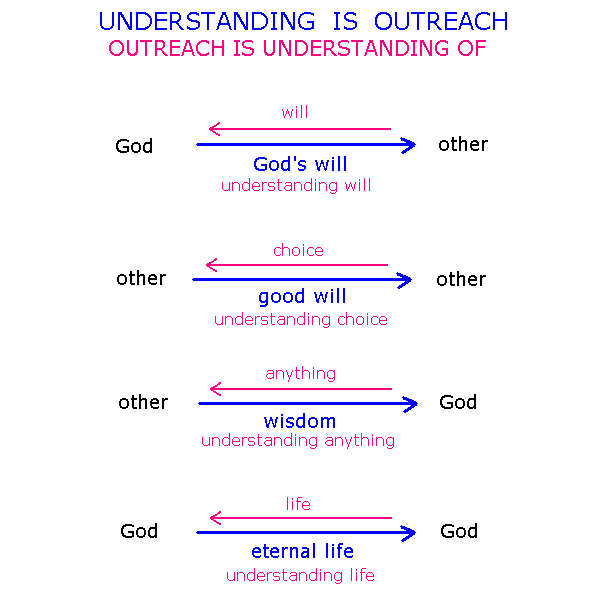
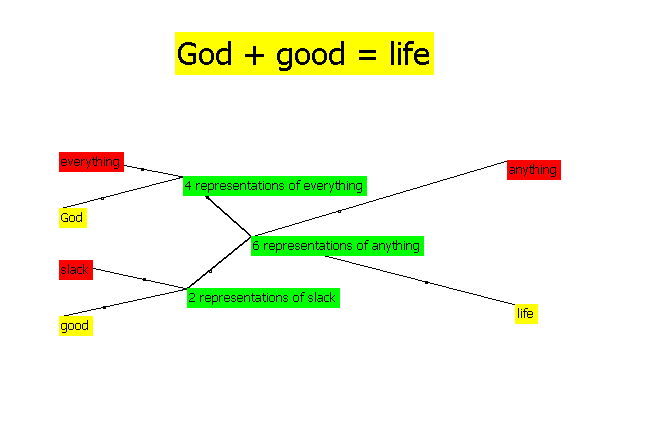
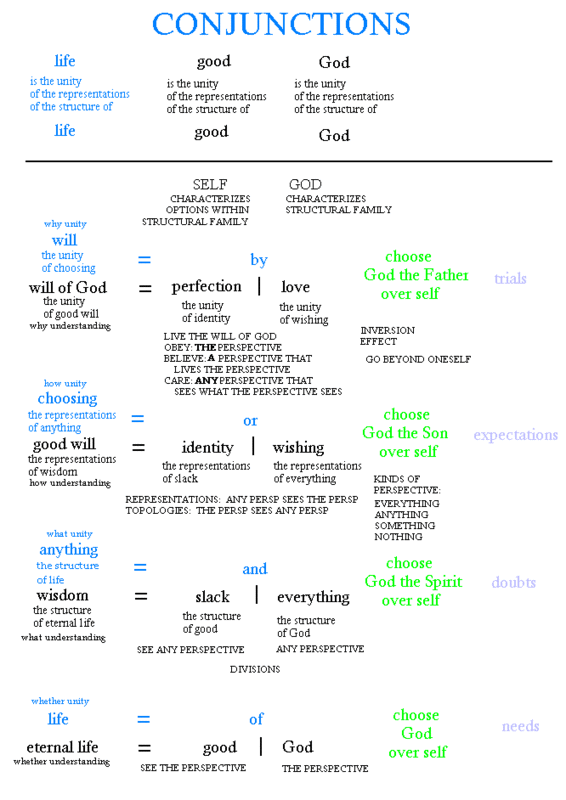

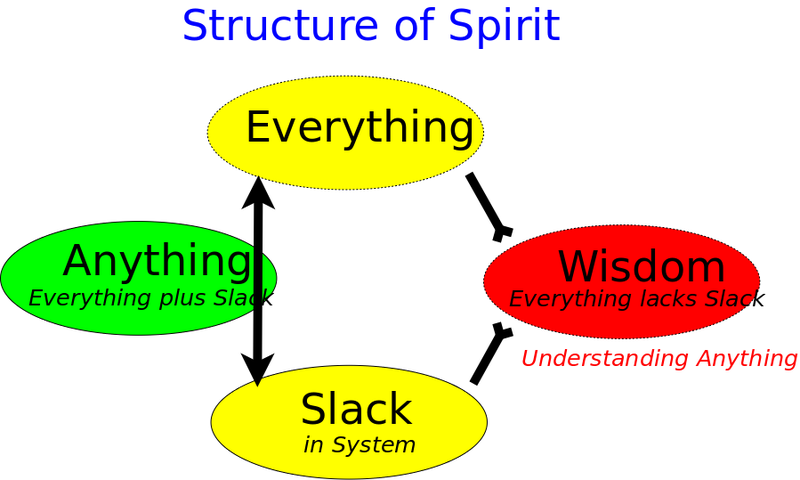
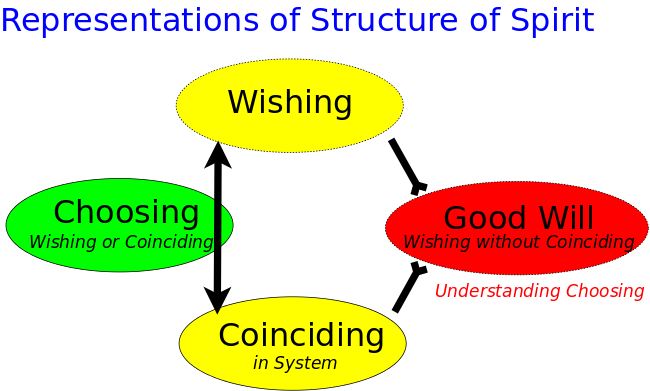

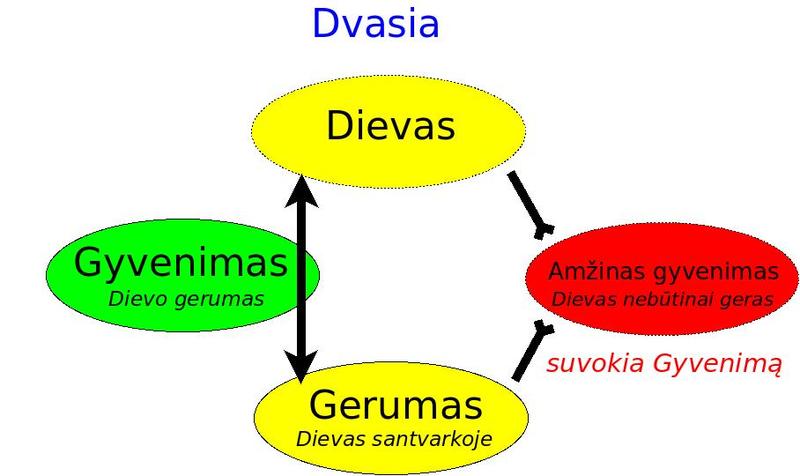
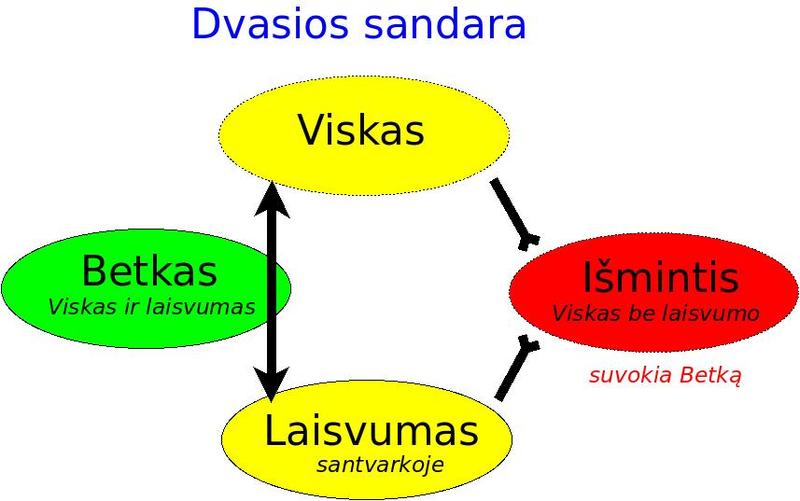
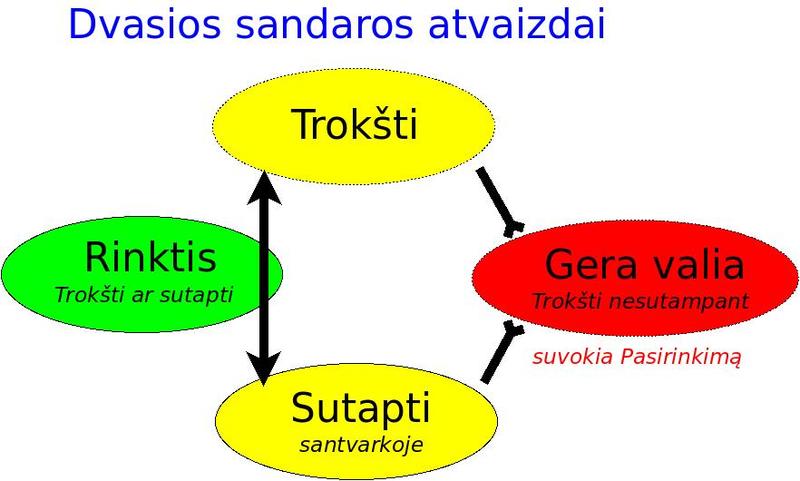
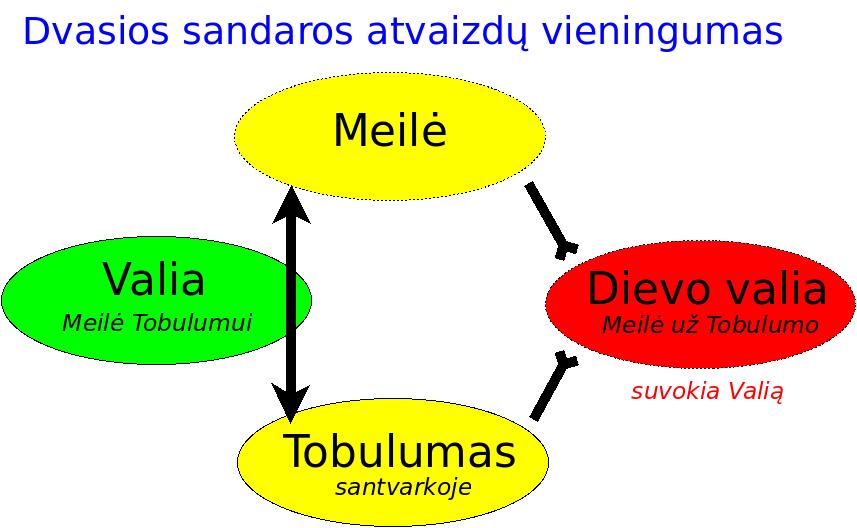
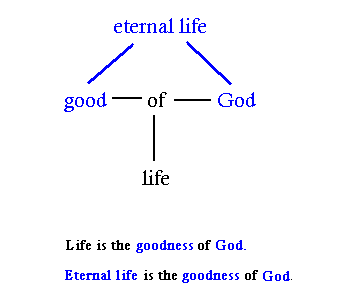
Laisvė vs. tobulumas
Freedom is perfection and is thus the complement of love. When we are perfect, then we are free, and when we are free, then we are perfect. I need to think about the four levels and how they express our system and our freedom and how we relate God outside of us and God within us.
Laisvė
Freedom is that by which the one who loves and the one who is loved may coincide regarding their views. The more they are separate, the more freedom there is. If they have no connection, then they are most separate. Freedom is perfection, but understood from to point of view of God's will. Perfection is extreme freedom, when it is completely collapsed, yet still free.
The four layers are the extent to which this equation holds as given by the level of access, all the way up to Love instead of God.
God loves through our freedom. We share freedom and that is how we can coincide through restrictions on our freedom. That is related to truth.
Meilė ir gerumas
Meilė yra tai, kas diegia gerumą dar nesant santvarkai, tad nesant blogumui. Ir tas gerumas visada su Dievu.
Mūsų žvilsnio vieningumą išreiškia Dievas kaip pažinovas, o mūsų žvilgsnio pilnumą išreiškia Dievas kaip pažintasis. Juos sieja tai, kas mums pažįstama, ir jie išsiskiria nuo to, kas mums pažįstama, savo nevaržomumu. Mūsų vaidmuo yra atverti kelią tam, kas mums pažįstama. Pažinovo meilę ir pažintojo gyvenimą sieja priėjimo būdu, kurį parūpiname. Jie yra pilnai susiję kai toks priėjimas įmanomas visais būdais.
- The observer contributes Understanding, which is the nature of love and the practice of life. The observer ever goes beyond themselves by taking up a view outside itself. The observer's understanding holds these views all separate. In the chain of views, God's view stays the same, but human's view evolves.
- The observed contributes Structure, which is the nature of life and the practice of love. The observed is ever reinterpreted in a new way that coincides with all the previous ways. The observer's structure holds these views all together. In the chain of reinterpretations, human's view stays the same, but God's view evolves.
- Understanding keeps the views different as they unfold so that there can be access in every way. Structure holds together the different views as applying to the same life.
We open up four kinds of access for God:
- God's will clears the way for love
- good will clears the way for wishing, which is the good heart
- wisdom clears the way for everything
- eternal life clears the way for God
(Relate these with everything, anything, something, nothing).
To know everything is for the human view and God's view to coincide. Such coinciding is central to love. This is the point of Jesus Christ. It occurs in its own way at each of the four levels, where God appears on both sides of each level, and taken together gives both God inside and God outside:
- God and human coincide as observer, as in eternal life - and this God is the same as the God who views a SecondaryStructure as a whole. Hence when we take up this God's view (as when we experience a part of a secondary structure) then that is what God views in the knowledge of everything. God's view of everything is manifested as his view of the whole of any secondary structure.
- God is also imagined as the onesome, twosome, threesome as divisions of everything, (operations +1, +2, +3), as in wisdom - and this by the Other who gives the counterresponses which define the PrimaryStructures
- God is also imagined as the slack, the goodness, inherent in the factoring of the secondary structures, and the seventh perspective as the ideal human, making way with good will - and this by the God who views the omniscope in all its angles.
- God is also what we view into which all structure collapses, as when we submit to God's will - and this God is the same as the God which God himself observes
The balance between God inside and God outside shifts according to whether they have access to each other by way of nothing, something, anything or everything. Taken all together there is complete coinciding.
The equation of EternalLife relates the two, the nature of love and of life, at four levels of access (Everything, Anything, Something, Nothing), which define the four primary structures. The secondary structures ensure that these primary structures are distinct. The four equations are:
- The operating principles allow us to see (life) through God's eyes, and be seen through his eyes (eternal life) - but this is the God who lies within us.
- The counterquestions allow us to see through another's eyes (anything), and be seen through their eyes (wisdom) - but this is the other within us.
- The directions to the good allow us to see (choosing) through another's eyes, and be seen (good will) through their eyes - this is the other beyond us.
- The life choices (the eightfold way) allow us to see (will) through God's eyes, and be seen (God's will) through his eyes - this is God beyond us.
How do they relate to God's perspective as it carries across the nature of love and the nature of life and relates them?
Žmogaus požiūris į Dievo požiūrį
- Human view of God's view is the recurring element for composing both the nature of love and the nature of life. It combines (human) life and (God's) love in the most atomic way.
Dievas kaip pažinovas ir kaip pažintasis
- It seems that the equations for eternal life are based on God as observed (through the omniscope, etc.) whereas the equations for life are based on God as observer (through divisions, etc.) Life is driven by static structures (divisions, representations, topologies) and eternal life is driven by dynamic structures (the three languages).
- Consider God as observed as chaos, and God as observer as order. So this is a relationship between chaos and order. And compare this with theater and the two Russian acting schools of Michail Chekhov (fantastical, logical) and Stanislovsky (psychological). (Thank you to Rimas Morkunas).
- When God is observer, then God coincides with good, he coincides with us, he goes beyond himself, into the bounded, and so this is life. He lives as the bounded. But when God is observed, then he is separate from good, we coincide with him, we go beyond ourselves to him, to the unbounded, and that is eternal life. We live as the unbounded. He waits for us.
- Tvarka, betvarkė, laisvė
- Priėjimas, tapatumas
Šališkumas ir nešališkumas
So the four levels express how we appear as the observational planes that God finds himself within. When the plane is nothing, then we are looking at ourselves as if from the side, as if objectively, so that God and good stand alone, and they are linked by life and separated by eternal life, and subjectively it's as if we're not there. Whereas love and perfection make sense by way of our subjectivity, and they are linked by our will and separated by God's will, and so that is taking place through our subjective experience. And so wishing and identifying make sense by way of the potential for our subjectivity, and they are linked by our choosing and separated by good will. And everything and slack make sense by way of the potential for our objectivity, and they are linked by anything and separated by wisdom. This suggests that the path from life to eternal life (yielding an eightfold way) has us develop our subjective self, which places the matter squarely before us - our will vs. God's will - allowing us to switch over to separating God and good rather than presuming they are linked. And then we can remove our subjectivity. But switching over is possible at every level, yet the matter is most pronounced to us subjectively when it is stated subjectively. This is the relationship between two lines: God as Observed (God) and God as Observer (good) and whether they are linked or separate. By separating them, we acknowledge the primacy of God as Observed who is prior to us and greater than us. And we are able to coincide with the God the Observer who looks through us, and by way of him, with God the Observed, so that we are all one.
Consider the extent the meaning of the four levels of access, including the extent to which love can be shared by God and human (perhaps greater the more "aware" that a person is, which is to say, the more engrossed they are in the views, thus the more stretched, the more having gone beyond, outside oneself) and how that allows for a switch between the outlook of "observer" and "observed" (by going beyond oneself) to an ever greater extent, and the question of what is in the way between the observer and observed outlooks, and how the equations of eternal life open up room to clear the way.
In the nature of love, God stays the same, but his and human's views are ever different along the chain. In the nature of life, the views ever coincide but God ever changes. What are the windows that God is opening up? They seem to be such that they allow for invertibility of the view or perhaps simply commutation. Note that the nature of life and the nature of love may each be thought of representations of the foursome for which the nulls are given by that level where God and human coincide. Thus, in the nature of love, the null is whether and we have what, how, why; and in the nature of life, the null is why, and we have how, what, whether.
In the nature of love, God and human's view are separated by nothing (thus a null, they are one - God as observer), something, anything or everything. In the nature of life, God and human's view coincide across nothing, something, anything, everything (thus a null, they are one - God as observed). At each level - everything, anything, something, nothing - are what relates God as observer (in terms of his separation from human) and God as observed (in terms of his coinciding with human). Human is the slack by which there is both separation and coinciding.
The relationship between God and human is thus one of increasing closeness and warmth. Human and God are related:
- first by life and eternal life
- then by anything and wisdom
- then by choosing and good will
- finally by will and God's will
So it is an ever stronger relationship of ever greater love and ever more intensely defined, internalized life. These are the chapters in the story of "knowing everything" and they lead us to a subordinate perspective where we take up God's will and live by that. And to do that means to be open and clear to all four levels? Is it cumulative?
- Related by way of nothing (wishes for nothing) The operating principles allow us to see (life) through God's eyes, and be seen through his eyes (eternal life) - but this is the God who lies within us.
- Related by way of something (wishes for something): The counterquestions allow us to see through another's eyes (anything), and be seen through their eyes (wisdom) - but this is the other within us.
- Related by way of anything (wishes for anything): The directions to the good allow us to see (choosing) through another's eyes, and be seen (good will) through their eyes - this is the other beyond us.
- Related by way of everything (wishes for everything): The life choices (the eightfold way) allow us to see (will) through God's eyes, and be seen (God's will) through his eyes - this is God beyond us.
The nature of love describes how unity reaches out from God as an observer, and the nature of life describes how concreteness reaches in from God as an observed. The four equations relate these two developments so that unity and completeness are joined together. This means that "knowledge of everything" allows the general view as given by God as the observer, to be placed in the most narrow and remote particular situation, which is found to be just a reinterpretation of the general situation. So we can move from God (God as observer) to good (God as observed).
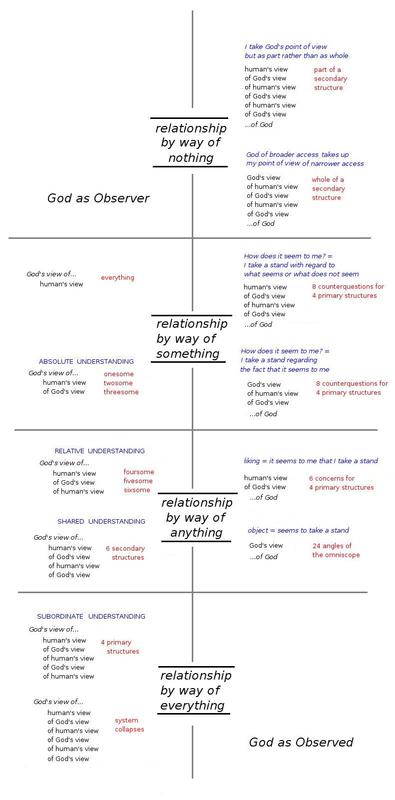
Užrašai
- Gyvenimo lygtis rodo kaip yra (Dievas - kodėl) ir nėra (gerumas - ar), kaip atrodo (gyvenimas - koks) ir neatrodo (amžinas gyvenimas - kaip).
- Iškyla klausimas ar Dievas tapatintinas su besąlygiškumu?
- Gyvenimo lygtis yra Dievo vidinio prieštaravimo sandara.
- Gyvenimo lygtis išsako Dievo prieštaringą būdą, jo nenuoseklumą. Prieštaravimas yra Dievo ir gerumo atskyrime, kad Dievas nebūtinai geras nors Dievas ir gerumas yra dvilypis, taigi Dievo pirmenybė yra prieštaringa.
- Dievo vidinis prieštaravimas yra ketveriopas:
- Tai gerumas - vidinė įtampa - pusė priešingybės - teigiama priešingybė.
- Tai būtent Dievo gerumas - tad gyvenimas - išgyventas gerumas.
- Tai amžinas gyvenimas - kad išgyventojas yra pirmesnis už išgyvenimą.
- Tai Dievas - kita priešingybė - kuris savistovis, tad besąlygiškas.
- Vidinis prieštaravimas reiškia, kad jau besąlygiškume glūdi laisvumas, jau Dieve glūdi gerumas.
- Gyvenimo lygtis grindžia požiūrius ir lygmenis.
- Dvasia išgyvena bendrai, sandaros tarpais, aplamai tarpu, žmogaus galimybe, Kitu.
- Gyvenimo lygties lygmenys visumą grindžia kaip sąvoką.
- Dievo valia (gyventi Kitu) yra vieningumas
- geros valios (gyventi Tavimi) - jos įvairiausių krypčių - kuriomis ji puoselėja laisvumą, išsaugoja laisvę - Dievas gali gyventi už žmogaus, o žmogus žmogumi - atvaizduojančią
- išmintį (gyventi Manimi) - tai sandara, išreiškianti
- amžiną gyvenimą (gyventi Dievu, amžinai bręstančiu) kuri suvedama su pirmapradžiu Dievu
Regarding God IS good: In what sense do I mean that it "is"? It "is" in that it is the unity of its properties. So you "are" only with regard to your own domain, where your properties extend, but you are "necessary" without any regard for domain, for here the unity is with regard to representations. In other words, existence is unity of the properties by which we see ourselves, and necessity is unity of the representations by which we are seen.
Laisvė išsakyta Dvejybės atvaizdo pirmasis narys išsako laisvę, atitinkamai liudijančią gerumo lygmenį.
- Laisva valia: yra gerumas
- Išorė: yra laisvumas
- Įžvalga: yra sutapimas
- Tapatumas: yra tobulumas
- Galima sieti: nulybė - dvasia, trejybė - sandara, šešerybė - atvaizdai, vienybė - vieningumas. O ką tuomet reiškia kiti padalinimai?
Dievas bręsta atgal į Dievą, užtat apima viską, atsakys už viską. Jis leidžia bendrystę (ir taip, ir ne), leidžia, kad būtų kiti, bet visgi jis yra Dievas ir toks būdamas iškyla, kaip pirmapradis.
- Kito Dievas yra Amžinas Gyvenimas (paklusimo Dievas - antrinėmis sandaromis)
- Tavo Dievas yra Gyvenimas (tikėjimo Dievas - pirminėmis sandaromis)
- Mano Dievas yra Gerumas (rūpėjimo Dievas - visaregio reikalai)
- Dievo Dievas yra Dievas (kada net nerūpi, yra tik nuoširdumas, tiesa)
Dievas apibrėžiamas einant link būtinumo. Ar Kito Dievas yra suvokiantis, protaujantis, mums prilygstantis, kaip ir mes?
- keturi lygmenys: nulybė (dvasia), vienybė (sandara), dvejybė (atvaizdai), trejybė (vieningumas)
- keturi atvaizdai: niekas (Dievas), kažkas (Aš), betkas (Tu), viskas (kitas)
- Loginė lygtis (gyvenimo lygtis?) - teiginiai - Quantifier - Subject - Copula - Predicate.
- Gyvenimo lygtis asmenimis išreiškia vidinių santykių ir išorinių santykių dvilypumą. Šį dvilypumą taip pat išreiškia matematika.
- Apibrėžimas <=> gyvenimo lygtis -> 3 veiksniai -> padalinimai <= Apibrežimas. Kaip gyvenimo lygtis reiškiasi pasirinkimų malūne.
- Gyvenimo lygtis - 4 asmenų lygmenys sudaro trejybės ratą - tad galima įžvelti keturis trejybės atvaizdus, aplinkybes 4x3. Tai yra, kiekvienam požiūrio lygties nariui yra trejybės atvaizdas. Ogi trejybės atvaizdus dėlioja ketverybė. Tad kaip suprasti. Ar tokiu būdu yra ryšys tarp požiūrio lygtis ir ketverybės? Juk ketverybė susijusi su trejybės visuma, su nulybės atvaizdais, tad gal požiūrio lygtis apibūdina, kaip įsivaizduoti paskirus trejybės narius?
- Tobulumas: buvimas ten kur turėtų būti, kaip kad gerasis vaikas.
- Tapatumą apibrėžia ženklų savybės, lygmenų poros. Nes tapatumas viename lygmenyje turi būti išreikštas netapatumu kitame lygmenyje. Tapatumas turi būti suvoktas ir įžvelgtas, įmanytas.
- Lygybė (meilės ir Dievo) yra metalygmens dingimas. O trejybėje nėra išorinio metalygmens (kodėl), tėra vidinis metalygmuo (ar).
- Lygybė, kaip antai X=X, prieštarauja sau, tai yra paprieštaravimo sandas. Lygybe dvi skirtingas sąvokas laiko ta pačia sąvoka.
- Gyvenimo lygtimi Tėvas supranta Sūnaus išėjimą (požiūrio lygtimi) kaip pasirinkimą vykstantį kiekvienoje pakopoje tarp sąvokos suvokėjo tame lygmenyje ir besąlygiško suvokėjo.
- Gyvenimo lygtis grindžia požiūrio lygtį kiekviename lygmenyje, tad grindžia padalinimų ratą kiekviename lygmenyje, tad grindžia tris veiksmus (tris pasirinkimus): Dievo šokis (+0), išgyvenimo apytaka - pasąmonė (+1), žinojimo rūmai - sąmonė (+2), meilės mokslas - sąmoningumas (+3).
Gyvenimo lygtimi asmuo gali rinktis Dievą
- Žmogaus gyvenimo esmė yra jo amžina dviprasmybė tarp gyvenimo ir amžino gyvenimo.
- Sąmoninga nulinė veikla yra įtampa be įtampos. Tai nulinis požiūris sutampantis su septintu požiūriu.
- Pavyzdžiui, ramybė sutampa su nerimu.
- Išeinama už savęs arba į save (nuline veikla) arba už savęs (nenuline veikla). Tad Man, Tau, Kitam nenulinė veikla sutampa su Dievo nuline veikla. Atsisakome savo nulinės veiklos vardan platesnės nulinės veiklos.
- Dievo savastis (Dievas, viskas, troškimai, meilė) yra asmeniui (Dievui, Man, Tau, Kitam) aukštesnis, sąmoningesnis, asmenį ugdantis lygmuo.
- Tai pasirinkimas tarp besąlygiškumo (nežinojimo, prielaidų) ir nešališkumo (žinojimo, išvadų).
- Tas pasirinkimas reiškiasi apytakose santvarkos išvertimu, kaip kad smegenų ir proto santykyje smegenų mokslo žinojimo rūmuose.
- Buvimo esmė yra išskyrimas savasčių ribomis daugybės lygiagretų gyvenimų, kuriuose klausimai Koks (nusakantis ribas) ir Kaip (tiriantis ribas) yra klausimo Kodėl atskirti (kad tyrimas galėtų vykti).
- Ar savastis yra mums (asmeniui, Dievui mumyse), ar savastis yra būčiai (Dievui už mūsų)? Viskas, visa savastis, yra Dievui už mūsų, o Dievas mumyse telieka asmuo būklėje. "Kas Cėzariaus Cėzariui, kas Dievo Dievui."
- Verčiau Dievo valia nė mano valia. Mano valia teturi dieviškumo. Dievo valios ir mūsų valios susivedimas (iš mūsų pusės). Tai meilė tiesai. Palyginti 4+6.
- Išmintis skiria apibrėžtumą (žinomumą) ir neapibrėžtumą (nežinomumą). Išmintis atskiria viską (apibrėžtumą - visų apimčių visumą) ir laisvumą (neapibrėžtumą - didėjantį ir mažėjantį - suprantame kaip santvarkos laisvumą). Yra keturios apimtys: nežinomas nežinomumas, žinomas nežinomumas, nežinomas žinomumas, žinomas žinomumas.
Dievas įvairiai plėtojasi gyvenimo lygtimi.
- Asmenų požiūriais: Dievas (joks požiūris), Aš (požiūris), Tu (požiūris į požiūrį), Kitas (požiūris į požiūrį į požiūrį). Tai iškylantis Dievas su savo buvimu.
- Mes išgyvename Mane (atsitokėjimą) ir Tave (įsijautimą), žemiškus ketverybės lygmenis.
- Kitas - tiesioginis gyvenimas
- Tu - požiūris
- Aš - požiūris į požiūrį
- Dievas - požiūris į požiūrį į požiūrį
- Mes išgyvename Mane (atsitokėjimą) ir Tave (įsijautimą), žemiškus ketverybės lygmenis.
- Dievo savastis: Dievas (dvasia - joks požiūris), viskas (sandara - požiūris), troškimai (atvaizdai - požiūris į požiūrį), meilė (vieningumas, esmė, tarpas - požiūris į požiūrį į požiūrį). Tai Dievas su savo nebuvimu.
- Seka "Dievas-Viskas-Troškimai-Meilė" taipogi veda iš Dievo į meilę. Tai seka iš nulybės (Dievo) į vienybę (Viską), į dvejybę (Troškimus) ir į trejybę (Meilę). Tai augantis požiūrių skaičius. Taip supranta Sūnus. Nors šiaip reikėtų suprasti atvirkščiai, iš Dievo nebūtinumo (meilės) į Dievo būtinumą (Dievą).
- Meilė apibrėžiama kaip Dievo esmė, jo sandaros atvaizdų vieningumas. Tačiau šiluma nuo to nepriklauso. Trejybės atvaizdas būtinas-tikras-galimas yra šaltas kaip ir nulybės atvaizdas tiesa. Trejybės atvaizdas būti-veikti-mąstyti yra šiltas kaip ir nulybės atvaizdas prasmingumas.
- Dievo vieningumas vyksta lygmenimis: Dievu, viskuo, troškimais, meile. Tie lygmenys nuasmenina Dievą, taip kad meilėje nelieka jokio asmens. Tad meilė yra tai, ką trejybė apibūdina, tuo tarpu ir Dievo trejybė apibūdina. Dievo trejybė, tai būtinumas, tikrumas ir galimumas, nes Dievas Tėvas yra būtinas, Dievas Sūnus yra tikras, o Dievas Dvasia yra galimas.
- Dievo savybės, tai nulybės atvaizdai;
- visko savybės, tai vienybės atvaizdai; tad manytina, jog
- troškimų savybės yra dvejybės atvaizdai ir
- meilės savybės yra trejybės atvaizdai, tai yra, aplinkybės.
- Savo santykiu su savimi: Dievas (besąlygiškas), gerumas (Dievas sąlygose), gyvenimas (Dievo ir gerumo sutapimas), amžinas gyvenimas (Dievo ir gerumo atskyrimas)
- Dievo esmė - Dievo vieningumas - meilė
- Mano esmė - gerumo vieningumas - tobulumas
- Tavo esmė - gyvenimo vieningumas - valia
- Kito esmė - amžino gyvenimo vieningumas - Dievo valia
Kitas svarbus net kai su juo neturime ryšio, net kai jis netobulas
- Dvasia yra buvimas, o jos esmė yra nebuvimas, tai yra, jos savasties nebuvimas.
Gyvenimo lygtis - aštuonerybė
- Ketverybė - Dievas, penkerybė - gerumas, šešerybė - gyvenimas, septynerybė - amžinas gyvenimas.
Šiaip gyvenimas ir amžinas gyvenimas
I would like to write more about "life" and "eternal life" as opposites, much like "decreasing slack" and "increasing slack". Briefly, we may think of life as the goodness of God (or structurally, anything is everything plus slack). But, as I read in the Gospel of John, eternal life is understanding the goodness of God. To understand the goodness of God is to keep the two concepts separate, to recognize good and God as independent concepts, and not to assume that they are related. Unfortunately, so often we presume that God is good. That is very harmful because it diminishes what God means to us. In our lives, we can testify to many injustices which have yet to be fixed. It is too early for us as witnesses to say that God is good. The facts aren't in yet! And to claim to know that God is good is to make him unreal. If we look forwards, outwards, then we think in terms of increasing slack, that yes, perhaps in the very end God is good, and yet there is an eternity of possibility for him to have that be so. God is not constrained by good, he does not have to be good, it is up to him whether he is. By presuming his goodness, we are constraining him, our narrow little minds are binding him to good, and we are therefore looking backwards. Our lives are finite, and we can explain away everything in them, until there is nothing left, and we have death.
I find it helpful to recognize that I, as a human, find it hard enough to wish for my own "life". In general, we tend to tune ourselves out, to diminish ourselves, to be unsuccessful, to dissipate ourselves, to walk away from our life. And so "eternal life" isn't even relevant. Scripture inspires me that it is not my wish, but God's wish that I live forever. If we define "love" as "support of life" (to love X = to support the life of X), then it is God's love for us that makes for eternal life. That is what God wants for us, not what we want for ourselves. If we understand life, if we understand the goodness of God, and if we disentangle the concepts of God and good, then we can look forwards, we can appreciate the reality of life so far, and we can be open to all the wrongs so far that may be yet redeemed, and all the many good things left that might come. We can and do live this "eternal life" now when we choose to allow for the open question of God's goodness and participate as a player - when we are sensitive, responsive, engaged. And we choose "death" when, alternatively, we consider it all closed and let that logic unravel any slack we have.
I liked very much Frank Mosca's letters. I think that the relation between "love" and "life" is very much that kind of give and take, that slack between structure and activity, which we may aesthetically ascribe to God with regard to us. And I am thinking that, just as we ought to shift from focusing on "life" to "eternal life" as I sketch above, but so we might shift from "love" (support of life as we might see it) to "God's love" (support of our life as the eternal life that he cares about).
If we live the open-ended outlook of eternal life, then I think that the CTMU might say that such an outlook can't be snapped by any physical events. Instead, we take our outlook with us, and all of our life which it connects to, into a broader reinterpretation that is open to connect with other such. Our life can be stopped only if we restrict ourselves to a closed outlook which, sadly, is the one that our society presumes upon us, and the one that would have us be reduced to nothing more than that which we have already been. The proof, so to speak, is that we are able to have an outlook "eternal life" which is not what we ourselves want, but what is given to us nonetheless, and which connects the unfolding future to our openness to it, so that it has a stake in our being ever alive, and we're able to drag the "real world" along with us, "uncollapsed" I suppose. The Psalmist clings to God's glory, for if his fate is tied to God's glory, then he will ever be alive.
In summary, I think that God would not be attractive if he might might forbid some good because it would also bring bad. I think that we, as systems, open ourselves and break out of evil by allowing for the question Whether? and the answer Why! as they naturally transcend us. Allowing for an answer Why! makes our question Why? meaningful, and allowing for a question Whether? makes our answer Whether! meaningful. We can thereby open ourselves to integration by that which is truly bigger than us, so that it might peer through us, see itself through us, and so live through us.
I think that the nature of life continuing openly, uncollapsed by physical events, is a question that we might apply the CTMU to, especially in defining further, what is life? We might be able to show what structures and activities in this world are actually relevant to that broader world. We might engineer bridges back and forth with that broader world, perhaps through prayer and good deeds. This might also have application to our health care systems. I look forward to exploring connections between the CTMU and my own quest "to know everything and apply that usefully". I'm especially stirred by Frank's letters on what I might think of as God's love. Here is my current attempt at an Overview of how everything unfolds.
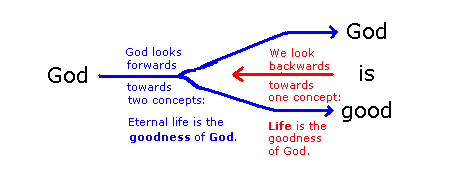
The Beginning looks Forwards and the End looks Backwards. But then the End recognizes the primacy of the Beginning and also looks Forwards.
Convergences
AndriusKulikauskas: I've always had trouble writing up my thoughts because they are murky, but even worse, they want to spin out in all directions.
- My starting point is God, and the related concept of everything.
- My ending point is life, as the fact that God is good. Life is the fact that God is good. Or more simply, Life is the goodness of God. Starting from just this one conclusion, I am able to explore Life, Good, God, Is, etc. and work Backwards, what do I mean? It's the conclusion that pulls everything together that I've been working on, and I find it attractive and natural. It leaves enormous room for clarification, elaboration. But it also works as a conclusion, in that I'm willing to take my stand here, and I'm able to confess my dogma, what I'll not retreat from. My [MinciuSodas/CoreValues core values], so to speak. This is a natural point of convergence, a conclusion from which I can work backwards and lead to all the structures that I know of.
- There is a greater assertion, which I have drawn from the Gospel of John: "Everlasting life is the understanding that God is good." I am finding that to work from "Life is the goodness of God" is to work backwards, whereas to work with "Endless life is understanding the goodness of God" is to work Forwards. Just as my backwards-looking conclusion reflects my outlook, so it seems that the forwards-looking assertion reflects God's outlook, his venturing outwards to everlasting life. How may my looking back, or yours, find God and take up his looking forwards?
Užrašai
- Trejybė: Dievas veda į amžiną gyvenimą (išėjimu už savęs į save; amžinas gyvenimas veda į gerumą; gerumas veda į Dievą (išėjimu už savęs iš savęs)
- Išmintis išskiria šešis (betko) atvaizdus - požiūrį ir būklę, Dievą, asmenį, asmenybę, pasaulį. Įmanomas Mano tyrimas.
- Gera valia plėtoja du lygiagrečius asmenis. Įmanomas Tavo tyrimas.
- Dievo valia sustato asmens trejopus santykius. Įmanomas Kito tyrimas.
- Gyvenimo lygtyje abi kryptys išsako suvokimo lygmenis. Keturi klodai (ketverybė) išsako kaip Dievas juos atveria asmenimis ir kaip mes juos priimame kaip savęs pranokimus Dievu. O požiūrio lygtis išsako kaip tai atrodo ne Dievui, iš šalies, tarsi santvarkos ribos išeities tašku. Jiems bendra yra keturi suvokimo lygmenys.
Ketverybė ir gyvenimo lygtis
- Ketverybe sąmoningumas išgyvena vienybę (viską), 3+1=4, išsiskiria Dievas (pagrindas) ir trys protai (požiūrių sekos) - keturi asmenys. Gyvenimo lygtimi Dievas išgyvena pasąmonę, su ja susitapatina. Pasąmonė yra Dievas, sąmonė - gerumas, gyvenimas yra jų sutapatinimas (sąmoningumui atleidus stabdį), o amžinas gyvenimas yra jų nesutapatinimas (sąmoningumui įjungus stabdį).
- Gyvenimo lygtis (4x4) ir apytaka (4x6) kartu sudejus yra 4 x (4+6). Tad gyvenimo lygtis ketveriopai išsako 4 teigiamus įsakymus, o apytaka ketveriopai išsako 6 neigiamus įsakymus.
Dievas nebūtinai geras
- "Dar daugel jums turėčiau kalbėti, bet dabar jūs negalite pakelti. Kai ateis toji Tiesos Dvasia, ji ves jus į tiesos pilnatvę." (Jn 16) Manau, tai ką apaštalai nebūtų pakėlę, tai būtent ta mintis: Dievas nebūtinai geras. Ši mintis, tai esmė mokslo, kurį pristatau.
Gyvenimo lygtis
Gyvenimo lygtis primena Toulmino pagrindimo lygtį, keturių požiūrių. O ta lygtis primena Budos keturias taurias tiesas:
In the same way I saw an ancient path, an ancient road, traveled by the Rightly Self-awakened Ones of former times. And what is that ancient path, that ancient road, traveled by the Rightly Self-awakened Ones of former times? Just this noble eightfold path: right view, right aspiration, right speech, right action, right livelihood, right effort, right mindfulness, right concentration...I followed that path. Following it, I came to direct knowledge of aging & death, direct knowledge of the origination of aging & death, direct knowledge of the cessation of aging & death, direct knowledge of the path leading to the cessation of aging & death...Knowing that directly, I have revealed it to monks, nuns, male lay followers & female lay followers... —Nagara Sutta
Slack variable susiję su Simplex algorithm